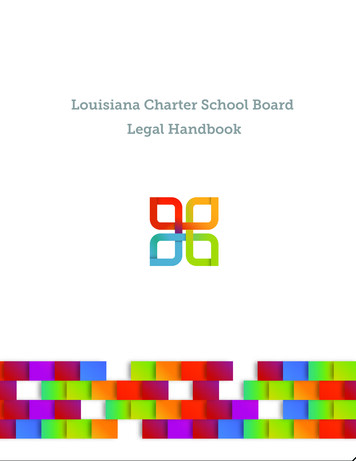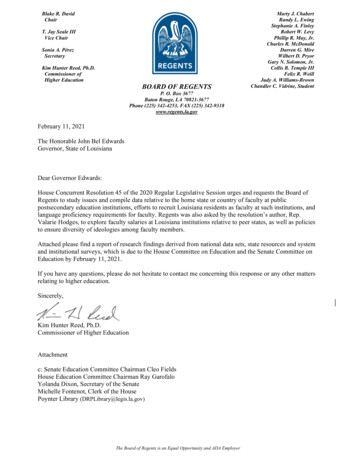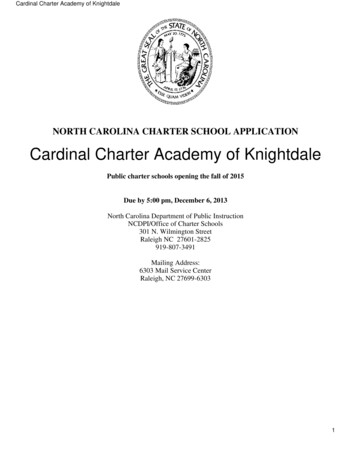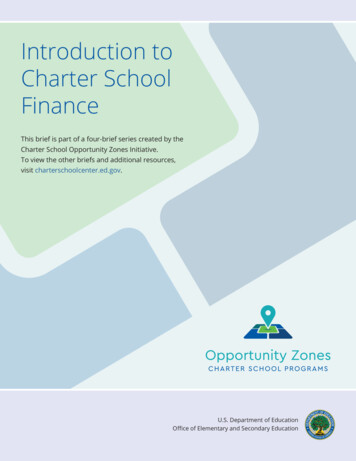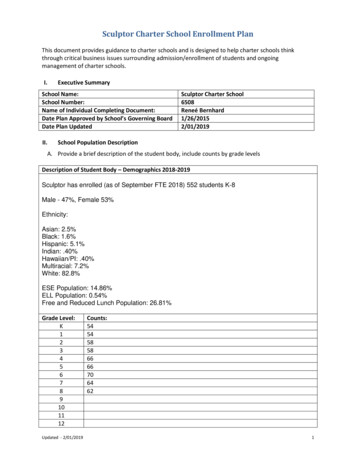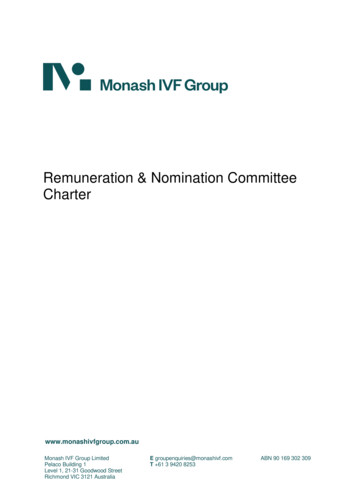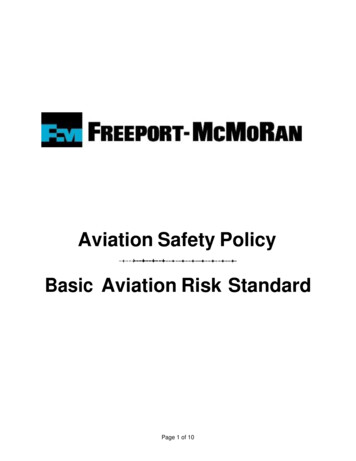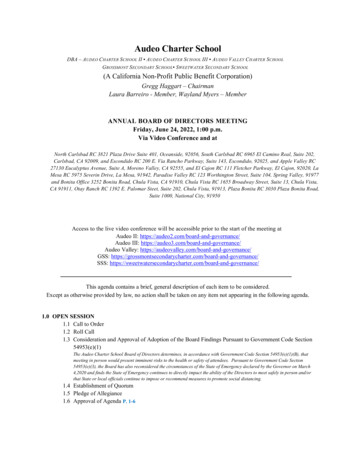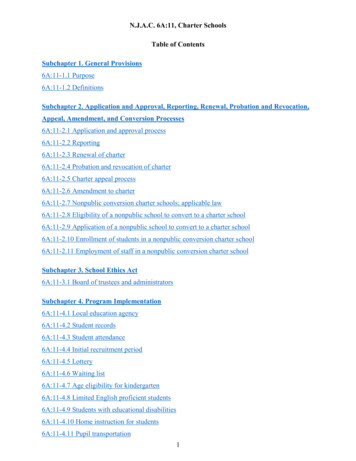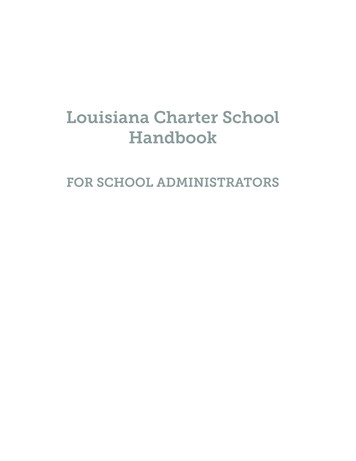
Transcription
Louisiana Charter SchoolHandbookFOR SCHOOL ADMINISTRATORS1
IntroductionTable of ContentsThe goal and purpose of this handbook is to help explain many of the complex rules and regulationsI. Louisiana Charter Schools: Overview. . . . . . . . . . . . . . . . . . . . . . . . . . . . . . . . . . . . . . . . . . . . . . . . . . . . . . . . . 5that apply to public charter schools. Please note that this handbook is a summary of the majorityA. Charter Schools: What are Charter Schools?. . . . . . . . . . . . . . . . . . . . . . . . . . . . . . . . . . . . . . . . . . . . . . . . . . . . . . . . . . . . . . . . 7of the existing rules and regulations that apply to your school and is not intended to coverB. Charter Schools: Types of Charter Schools. . . . . . . . . . . . . . . . . . . . . . . . . . . . . . . . . . . . . . . . . . . . . . . . . . . . . . . . . . . . . . . . . . 8all scenarios your school may face, nor is it designed to provide legal advice. It is always wiseC. Charter Schools: The Charter Contract . . . . . . . . . . . . . . . . . . . . . . . . . . . . . . . . . . . . . . . . . . . . . . . . . . . . . . . . . . . . . . . . . . . . 10to consult with an attorney regarding issues specific to your school. Also, be sure to check with yourD. Charter Schools: Accountability, Renewal, & Revocation . . . . . . . . . . . . . . . . . . . . . . . . . . . . . . . . . . . . . . . . . . . . . . . . . . . . 11school’s authorizer as to the most current laws and policies that may apply.E. Charter Schools: Contract Amendments. . . . . . . . . . . . . . . . . . . . . . . . . . . . . . . . . . . . . . . . . . . . . . . . . . . . . . . . . . . . . . . . . . . 12This handbook is split into five major sections: (1) Charter School Overview; (2) Charter SchoolOperations; (3) Compliance with State Public Laws; (4) Charter School Exemptions and RequirementsII. Charter School Operations. . . . . . . . . . . . . . . . . . . . . . . . . . . . . . . . . . . . . . . . . . . . . . . . . . . . . . . . . . . . . . . . . . . . . 13A. Charter School Operations: Chain of Command . . . . . . . . . . . . . . . . . . . . . . . . . . . . . . . . . . . . . . . . . . . . . . . . . . . . . . . . . . . . 15per La. R.S. 17:3996; and (5) Special Programs Relating to English Language Learners and StudentsB. Charter School Operations: At-Will Employment, Collective Bargaining, & Benefits . . . . . . . . . . . . . . . . . . . . . . . . . . . . 16with Disabilities.C. Charter School Operations: Personnel Requirements & Policies . . . . . . . . . . . . . . . . . . . . . . . . . . . . . . . . . . . . . . . . . . . . . 17This handbook is only a reference guide and is not a comprehensive description or explanation of alllaws that apply to a charter school. Should your school have further questions after reviewing thishandbook, Louisiana Appleseed, the Louisiana Association of Public Charter Schools, your school’sauthorizer, the Louisiana Department of Education, and your school’s attorney may have resourcesavailable to help you.Thank you for your dedication to serving and educating Louisiana’s students.D. Charter School Operations: Federal Compliance for Student Issues. . . . . . . . . . . . . . . . . . . . . . . . . . . . . . . . . . . . . . . . . . 22III. Charter School Compliance with State Public Laws. . . . . . . . . . . . . . . . . . . . . . . . . . . . . . . . . . . 23A. Charter School Compliance: Public Laws . . . . . . . . . . . . . . . . . . . . . . . . . . . . . . . . . . . . . . . . . . . . . . . . . . . . . . . . . . . . . . . . . 25B. Charter School Compliance: Code of Governmental Ethics, La. R.S. 42:1101 et seq. . . . . . . . . . . . . . . . . . . . . . . . . . . . . 26C. Charter School Compliance: Open Meetings Law, La. R.S. 42:11 et seq. . . . . . . . . . . . . . . . . . . . . . . . . . . . . . . . . . . . . . . . 29D. Charter School Compliance: Local Government Budget Act, La. R.S. 39:1301 et seq. . . . . . . . . . . . . . . . . . . . . . . . . . . . 32E. Charter School Compliance: Public Records Act, La. R.S. 44:1 et seq. . . . . . . . . . . . . . . . . . . . . . . . . . . . . . . . . . . . . . . . . . 34F. Charter School Compliance: Public Bid Law, La. R.S. 38:2211 et seq. . . . . . . . . . . . . . . . . . . . . . . . . . . . . . . . . . . . . . . . . . 36IV. Charter School Exemptions and Requirements. . . . . . . . . . . . . . . . . . . . . . . . . . . . . . . . . . . . . . . . . 39A. Charter School Exemptions & Requirements: La. R.S. 17:3996 Overview . . . . . . . . . . . . . . . . . . . . . . . . . . . . . . . . . . . . . . 41B. Charter School Exemptions & Requirements: Student Enrollment. . . . . . . . . . . . . . . . . . . . . . . . . . . . . . . . . . . . . . . . . . . . 45C. Charter School Exemptions & Requirements: Curriculum . . . . . . . . . . . . . . . . . . . . . . . . . . . . . . . . . . . . . . . . . . . . . . . . . . . 52D. Charter School Exemptions & Requirements: Student Assessment & Accountability. . . . . . . . . . . . . . . . . . . . . . . . . . . . 57E. Charter School Exemptions & Requirements: Student Rights. . . . . . . . . . . . . . . . . . . . . . . . . . . . . . . . . . . . . . . . . . . . . . . . 59F. Charter School Exemptions & Requirements: Student Conduct & Discipline. . . . . . . . . . . . . . . . . . . . . . . . . . . . . . . . . . . 62G. Charter School Exemptions & Requirements: Student Health & Safety. . . . . . . . . . . . . . . . . . . . . . . . . . . . . . . . . . . . . . . . 68H. Charter School Exemptions & Requirements: School Facilities & Operations . . . . . . . . . . . . . . . . . . . . . . . . . . . . . . . . . . 71V. Special Programs: English Language Learners & Students with Disabilities . . . . 75Appendix. . . . . . . . . . . . . . . . . . . . . . . . . . . . . . . . . . . . . . . . . . . . . . . . . . . . . . . . . . . . . . . . . . . . . . . . . . . . . . . . . . . . . . . . . . . . . . . . 8323
Glossary of Commonly UsedAbbreviations and AcronymsADA: Americans with Disabilities ActBESE: Louisiana Board of Elementary and Secondary EducationCMO: Charter Management OrganizationELL: English Language LearnersEMO: Education Management OrganizationFAPE: Free and Appropriate Public EducationFERPA: Family Educational Rights and Privacy ActLouisiana Charter Schools:OverviewIDEA: Individuals with Disabilities Education ActIEP: Individualized Education ProgramLDE: Louisiana Department of EducationLEA: Local Education AgencyLSB: Local School BoardRSD: Recovery School DistrictSection 504: Section 504 of the Rehabilitation Act of 1973SPED: Special Education (specifically, students who have been identified as a student with an exceptionality, notincluding gifted and talented, per La. R.S. 17:1942(B))45
I. Louisiana Charter Schools: OverviewA. Charter Schools: What are Charter Schools?Unlike with traditional public schools—where schools located within a certain jurisdiction are subject to rules,regulations, and attendance zones set by a local school board—charter schools are independent public schoolsthat are given educational and operational autonomy in exchange for performance-based accountability.In essence, charter schools operate from 3 basic principles:1. Choice: Parents select the school their child attends.2. Autonomy: Charter schools are free to make timely decisions on issues specific to their school such asdeveloping curricula, structuring the school day and year, creating a balanced budget, and hiring staff whomeet the needs of their students.3. Accountability: In exchange for autonomy, charter schools are held accountable via a performance-basedcontract and must meet certain academic, financial, and legal standards within an allotted time frame orrisk closure.In Louisiana there are 3 primary sources for charter school laws, rules, and regulations:1. Law: Charter School Demonstration Programs – La. R.S. 17:3971, et seq. Charter school law is typically updated or amended annually during the legislative session.2. Policy: Bulletin 126 of the Louisiana Board of Elementary and Secondary Education (BESE) governsthe implementation of charter school law. Most of its provisions apply to Type 2 and 5 charter schools only,but some provisions apply to all charter schools – 28 La. Admin. Code, Bulletin 126. Parish and city school boards may have specific rules that differ from BESE. Be sure to check localrules if authorized by a Local School Board (LSB). BESE and LSB policies are updated often. Regularly ask your authorizer for the most currentversion.3. Contract: Charter contracts are unique to each individual school. Always review your contract forrequirements specific to your school and its mission. 6Contracts can be amended during the contract term (often subject to authorizer approval) orrenegotiated during the renewal process.7
B. Charter Schools: Types of Charter SchoolsTypes of Charter Schools Chart:In Louisiana, there are 6 types of charter schools:1. Type 1: a new school chartered by a LSB.2. Type 2: a new school or a converted pre-existing school chartered by BESE.3. Type 3: a converted pre-existing school chartered by a LSB.4. Type 3B: a former Type 5 charter school transferred from the Recovery School District (RSD) to a LSB.5. Type 4: a new school or a converted pre-existing school chartered by BESE to a LSB.6. Type 5: a formerly “failing” school chartered by BESE and supervised by the RSD.Source: La. R.S. 17:3973; 28 La. Admin. Code, Bulletin 126, § 107.Type 3B Charter Schools: This type was created to account for the return of a Type 5 charter school from the RSDback to a LSB. The LSB shall permit a Type 3B charter school to remain in the facility in which it was located at thetime of transfer or provide it with another facility for use. Pursuant to rules and regulations adopted by BESE, the LSBmay require a Type 3B charter school to participate in unified processes common to other public schools located inthe same parish or school district boundaries, such as those processes relating to student enrollment, expulsion, andtransportation. Additionally, Type 3B schools are permitted to remain as their own Local Education Agency (LEA).Type1Local School Board(LSB)Charter ContractPartiesLSB Nonprofit BoardNew School vs.ConversionAdmissionsNew SchoolEconomically Disadvantaged& Special Education (SPED)enrollment requirements; mayhave admission requisitesconsistent with missionEconomically Disadvantaged& SPED requirements; may haveadmission requisites consistentwith missionEconomically Disadvantaged &SPED requirements; may haveadmission requisites consistentwith mission2BESEBESE Nonprofit BoardEither3LSBLSB Nonprofit BoardConversion3BLSBLSB Nonprofit BoardConversion:former Type 5returned to a LSBOpen enrollment onlyBESE LSBEitherEconomically Disadvantaged &SPED requirements; may haveadmission requisites consistentwith missionBESE Nonprofit BoardConversion:under thejurisdiction of theRSDOpen enrollment only4Note: Act 91 of the 2016 Regular Legislative Session requires all Type 5-RSD charter schools located in OrleansParish to return to the jurisdiction of the Orleans Parish School Board as Type 3B charter schools by July 1, 2018(though, the return date may be extended by agreement between OPSB and BESE through July 1, 2019).Authorizer5BESEBESESource: La. R.S. 17:3981.1, 17:3973, 17:3995, 17:3999, 17:10.7.1, 17:100.11; 28 La. Admin. Code, Bulletin 126, §§ 301, 401-423.Economically Disadvantaged means any one of the following characteristics of a student: (a) Is eligible forLouisiana's food assistance program for low-income families; (b) Is eligible for Louisiana's disaster food assistanceprogram; (c) Is eligible for Louisiana's program for assistance to needy families with children to assist parents inbecoming self-sufficient; (d) Is eligible for Louisiana's healthcare program for families and individuals with limitedfinancial resources; (e) Is eligible for reduced price meals based on the latest available data; (f) Is an English LanguageLearner; (g) Is identified as homeless or migrant pursuant to the McKinney-Vento Homeless Children and YouthAssistance Act and the Migrant Education Program within the Elementary and Secondary Education Act; (h) Isincarcerated with the office of juvenile justice or in an adult facility; or (i) has been placed into the custody of the state.Note: See Section IV(B)(2) of this handbook for an explanation of the Economically Disadvantaged and SPEDenrollment requirements.Source: La. R.S. 17:3973, 17:3991.89
C. Charter Schools: The Charter ContractD. Charter Schools: Accountability, Renewal, and RevocationA public charter school comes to life through, and is governed by, a charter contract between a charter operator and acharter authorizer.Regardless of type, the validity of each charter contract is contingent upon the school’s ability to meet certainacademic, financial, and legal standards within an allotted time frame. If the school meets those requirements,then the contract can be renewed for another set time period; but if the school fails to do so, the contract cannot berenewed and the school will either be closed altogether or transferred to a different operator. Additionally, the chartercontract can be revoked at any time by a majority vote of the authorizer if the authorizer finds that the operatorviolated the contract, fiscal standards, or the law (this type of revocation generally occurs when there is a grossviolation or the health and safety of students are at risk).Similar to all other service contracts, the charter contract is a legal agreement that sets the expectations for theoperator and authorizer over a set term. It defines both the operator’s rights to manage the school and the authorizer’smonitoring and oversight responsibilities. Charter Operator: The non-profit corporation or LSB (Type 4) authorized to operate a charter school. Charter Authorizer: LSB or BESE; responsible for monitoring and overseeing authorized charter schools. Education Service Providers (ESPs)/Education Management Organizations (EMOs): Charter operatorsmay hire a third-party to manage the school’s academic, fiscal, and operational services on behalf of theschool’s board of directors. These for-profit companies are commonly referred to as Education ServiceProviders (ESPs) or Education Management Organizations (EMOs). Any charter operator that enters into acontract with an ESP/EMO must notify the authorizer and give the authorizer a copy of the contract. Charter Management Organizations (CMOs): Charter operators authorized to operate more than onecharter school through a non-profit network are commonly referred to as CMOs.Note: Even though the charter contract encompasses the agreed-to provisions between an operator and anauthorizer over a set term charter school law, an authorizer’s policy, and BESE policy may at times overrideprovisions of the contract. Know the terms of your charter agreement and always check with your authorizer regarding any policychanges that may affect your contract.Renewal Timeline: All charter schools are initially authorized for a single 4-year term that may be extended fora maximum initial term of 5 years. Thereafter, charter contracts may be renewed for additional periods of3-10 years based on performance. All renewal decisions must be made by January 31 of the year in which the contract term expires. As aresult, renewal decisions are based upon the cumulative performance data collected from the beginningof the charter term through the school year immediately preceding the final year.Automatic Renewal: Charter school law and BESE policy permit high-performing charter schools to beautomatically renewed if they meet certain benchmark standards (particularly around academic and financialperformance). Check with your authorizer to see if your school is eligible for automatic renewal. Renewal Changes: The academic, financial, and legal standards for charter schools are periodicallyrevised by authorizers; be sure to check with your authorizer as to any policy changes that may impactyour school’s renewal. Revocation Terms: Be familiar with the specific policy and contractual provisions that permit yourauthorizer to immediately revoke the contract, as well as the related procedures for revocation.Source: La. R.S. 17:3973; 28 La. Admin. Code, Bulletin 126, §§ 103, 701-707.Source: La. R.S. 17:3992, 17:3998; 28 La. Admin. Code, Bulletin 126, §§ 1301-1303, 1501-1503.1011
E. Charter Schools: Contract AmendmentsAn operator, through its governing board, may seek to amend its charter contract during the course of the contract’sterm. All amendments must be submitted to the authorizer: Material Amendments require subsequent approval by the authorizer. Generally, these types of amendments make substantive changes to a charter school’s governance,operational, or academic structure.Non-Material Amendments are effective upon approval by the charter school’s board.These are non-substantive changes to the contract, such as designated contact information for the school.Authorizers regularly update what qualifies as “material” and “non-material” amendments, so always check with yourauthorizer before amending the contract.Charter SchoolOperationsAmendment Requirements and Restrictions: No amendment may be the basis of extending a contract’s term. The amendment must be designed to help further the stated objectives of the school. An amendment must be proposed and approved by the school’s governing authority(the charter school board). Charter schools seeking to enroll more than 120% of the total number of students approved in the chartercontract must formally amend the contract to permit the enrollment increase.Source: La. R.S. 17:3991(C), 17:3992(B); 28 La. Admin. Code, Bulletin 126, §§ 1901-1905.1213
II. Charter School OperationsA. Charter School Operations: Chain of CommandA charter operator must be organized as a non-profit corporation, and its board of directors—as holder of thecharter contract—exercises final authority in all matters affecting the school. The board may utilize any power andperform any function (not prohibited by law) that is necessary, requisite, or proper for the management of the school.Accordingly, the board is ultimately held responsible for the academic, financial, and legal performance ofthe school.But while a charter school board’s overall purpose is to govern the charter school, it is not tasked with running theschool’s daily operations—that duty belongs to the school’s leader (i.e. either the principal of an individual charterschool or the chief executive officer of a charter management organization). The board develops school policies and sets goals and expectations; the school leader implements theboard’s policies and carries out the school’s academic and operational programs on a day-to-day basis. The board assesses “what” needs to get done; the school leader is entrusted with “how” to do it. The board hires and evaluates the school leader; the school leader hires and evaluates all other ellenceCompliance &Human Resources14Board·Approves annual budget·Reviews periodic financial reports·Ensures proper internal controls are inplace·Ensures annual financial audit isperformed by an independent firm·Ensures academic benchmarks:examines whether the what are beingmet or on target·Offers oversight of academic program;approves pupil progression plan & testsecurity policy·Hires & sets compensation for schoolleader; approves benefits offered to allstaff·Approves all required local, state, &federal student and staff policiesSchool Leader·Prepares/proposes annual budget·Oversees preparation of periodicfinancial reports·Implements proper financialcontrols·Delivers academic programaligned with the charter contract’sspecifications·Determines how the instructionalprogram is delivered·Determines qualifications & hiresstaff·Responsible for school personnelmanagement and evaluations15
B.Charter School Operations: At-Will Employment, CollectiveBargaining, and BenefitsCharter schools may, but are not required to, enter into fixed-term contracts with their employees. While contractualpromises of certain benefits or a level of job security may serve as a recruiting tool for certain employees—particularlyhigher-level employees such as the school leader—charter schools may hire employees for any position on anat-will basis.At-Will Employment: The employer or employee can terminate the employment relationship at any time and for anyreason, including for no reason at all, so long as the reason is not for a discriminatory or unlawful purpose. At-will status can be negated by any references made by the employer that employment is for a specific lengthof time and can only be terminated for just cause. All offer letters and employee handbooks should contain clear at-will provisions, and any verbal agreementsor employment discussions should not be misleading as to at-will status.Fixed-Term Contracts: The employer and employee have agreed to a set term for employment (e.g., 3 years or until“x” is accomplished) and can only be terminated for specified reasons.Collective Bargaining Agreements: Any collective bargaining agreement entered into by the LSB in whosejurisdiction a charter school is located applies to that charter school unless the school’s approved charter contractprovides otherwise. Additionally, charter schools may become subject to a collective bargaining agreement assertedupon it by its employees.Benefits: All potential charter school employees must be notified of the specific benefits they will be offered. As public schools, a charter school may elect to participate in the state’s employees' and teachers' retirementsystems, or it may offer a private benefit plan (such as a 401k or 403b plan)—as provided for in the chartercontract. Each charter school must offer its employees the opportunity to participate in the Louisiana Public EmployeesDeferred Compensation Plan.Source: La. R.S. 17:81(Z), 17:3996(B)(36), 17:3997; 26 U.S.C. § 457; 28 La. Admin. Code, Bulletin 126, §§ 2901, 2909; La. Civ. Code. art. §§ 2024, 2747,2748-2750; Quebedeaux v. Dow Chemical Co,. 2001-2297 (La. 6/21/02); 820 So.2d 542.C. Charter School Operations: Personnel Requirements and Policies1. Equal Opportunity Employer: A charter school shall recruit, employ, and train teachers, administrators, and otheremployees without regard to race, color, religion, sex, or national origin. Charter schools must comply with all stateand federal laws otherwise applicable to public schools with respect to civil rights and individuals with disabilities.Source: La. R.S. 17:3996(C).2. Teacher Certifications: Per charter school law, charter school instructional staff may, but are not required to, bestate-certified teachers; at a minimum, they must have a baccalaureate degree and be subject to all provisions of statelaw relative to background checks. However, per some funding sources (e.g. federal or state grants), some charterschool staff may be required to be certified for certain programs (e.g. Pre-K and SPED teachers).Source: La. R.S. 17:3991(C)(6); 28 La. Admin. Code, Bulletin 126 § 2901.3. Background Checks and Criminal Reporting: Charter schools must conduct a background check on allemployees—including those who have been given a position of supervisory or disciplinary authority over children (e.g.teachers, bus drivers, and substitutes) as well as those who might reasonably be expected to be placed in a positionof supervisory authority over students (e.g. maintenance staff and cafeteria workers). The charter school itself,and not a third party contractor, must submit background check requests and fingerprints of all employeecandidates to the Louisiana Bureau of Criminal Identification and Information of the Louisiana State Police.Criminal background checks cannot be transferred between schools and must be conducted every time an employeechanges employers. La. Bureau of Criminal Identification and Information:P.O. Box 66614, #A-6Baton Rouge, LA 70896-6614(225) 925-6095http://www.lsp.org/technical.html Hiring Prohibitions: No person who has been convicted of or has pled nolo contendere to a crime listed inLa. R.S. 15:587.1(C) (see appendix) shall be hired as a charter school teacher/substitute teacher, bus driver/substitute, janitor, or as a temporary, part-time, or permanent school employee. An “expunged” record doesnot negate this requirement. Hiring exceptions may only be made with written approval of the district judgeand district attorney or written documentation that the conviction was reversed or vacated. Arrest Notifications: If a current employee is arrested for one or more of the specified offenses relative tosexual morality affecting minors in La. R.S. 17:16, any of the crimes listed in La. R.S. 15:587.1, or any justifiedcomplaint of child abuse or neglect on file in the central registry pursuant to Article 615 of the LouisianaChildren’s Code, the employee must report the incident to the school and the school must report theemployee to proper authorities (e.g. the charter board, authorizer, and/or LDE) within 24 hours of the arrestor before the employee’s next shift if the arrest occurs on a weekend or legal holiday—even if the employeewas not performing a work-related task at the time of the offense. DUI: Any school bus operator who has been arrested for driving under the influence of alcohol or drugsmust report the incident to the charter school within 24 hours of the arrest or before the start of his or hernext shift, whichever time period is shorter—even if the arrest occurred when the bus operator was driving hisor her personal vehicle or not performing work-related duties at the time of the arrest.Source: La. R.S. 17:16, 17:491.3; 28 La. Admin. Code, Bulletin 126 § 2905.1617
4. Employee Thresholds for Major Federal Employment Laws:At least 20 Employees:At least 1 Employee: Age Discrimination in Employment Act (ADEA): Prohibits discrimination against people age 40 or older.Source: 29 U.S.C § 623; 42 U.S.C. §§ 621 et seq. Equal Pay Act: Prohibits sex-based wage discrimination between men and women in the same establishmentwho perform jobs that require substantially equal skill, effort, and responsibility under similar workingconditions. Source: 29 U.S.C. § 206(d). Fair Labor Standards Act (FLSA): Establishes minimum wage, overtime pay, recordkeeping, and youthemployment standards. Source: 29 U.S.C. §§ 201 et seq. Federal Income Tax Withholding: Requires employers to withhold a certain amount of taxes from anemployee’s paycheck based upon the number of exemptions that an employee claims and the amount ofincome that is being paid. Source: 26 U.S.C. § 3402. Employment Retirement Income Security Act (ERISA): Establishes minimum standards for pension plansin private industry and provides for extensive rules on the federal income tax effects of transactions associatedwith employee benefit plans. Source: 29 U.S.C. §§ 1001 et seq. Occupational Safety and Health Act (OSHA): Ensures that employers provide employees with anenvironment free from recognized hazards, such as exposure to toxic chemicals and unsanitary conditions.Source: 29 U.S.C. §§ 651 et seq.Health Insurance Portability and Accountability Act (HIPAA): Provides privacy standards to protect anindividual’s medical records and other health information. Source: 42 U.S.C. § 300gg, 29 U.S.C. §§ 1181 et seq.,42 U.S.C. §§ 1320d et seq. Uniformed Services Employment and Reemployment Rights Act: Protects civilian job rights and benefitsfor veterans and members of Reserve components. Source: 38 U.S.C. §§ 4301-4335. At least 15 Employees: Title VII of the Civil Rights Act: Prohibits discrimination on the basis of race, sex, national origin, andreligion; enforced by the Equal Employment Opportunity Commission (EEOC). Source: 42 U.S.C. §§ 2000(e) et seq. Americans with Disabilities Act (ADA): Prohibits discrimination against a qualified individual with adisability; requires employers to provide reasonable accommodations. Source: 42 U.S.C. §§ 12101 et seq. Pregnancy Discrimination Act: Prohibits discrimination based on pregnancy when it comes to any aspect ofemployment, including hiring, firing, pay, job assignments, promotions, layoff, training, fringe benefits, andany other term or condition of employment. Source: 42 U.S.C. §§ 2000(e) et seq. Consolidated Omnibus Benefits Reconciliation Act (COBRA): Gives workers and their families who losetheir health benefits the ability to continue group health benefits provided by their group health plan forlimited periods of time under certain circumstances such as voluntary or involuntary job loss.Source: 29 U.S.C. §§ 1161 et seq.At least 50 Employees: F
8 9 B. Charter Schools: Types of Charter Schools In Louisiana, there are 6 types of charter schools: 1. Type 1: a new school chartered by a LSB. 2. Type 2: a new school or a converted pre-existing school chartered by BESE. 3. Type 3: a converted pre-existing school chartered by a LSB. 4. Type 3B: a former Type 5 charter school transferred from the Recovery School District (RSD) to a LSB.
